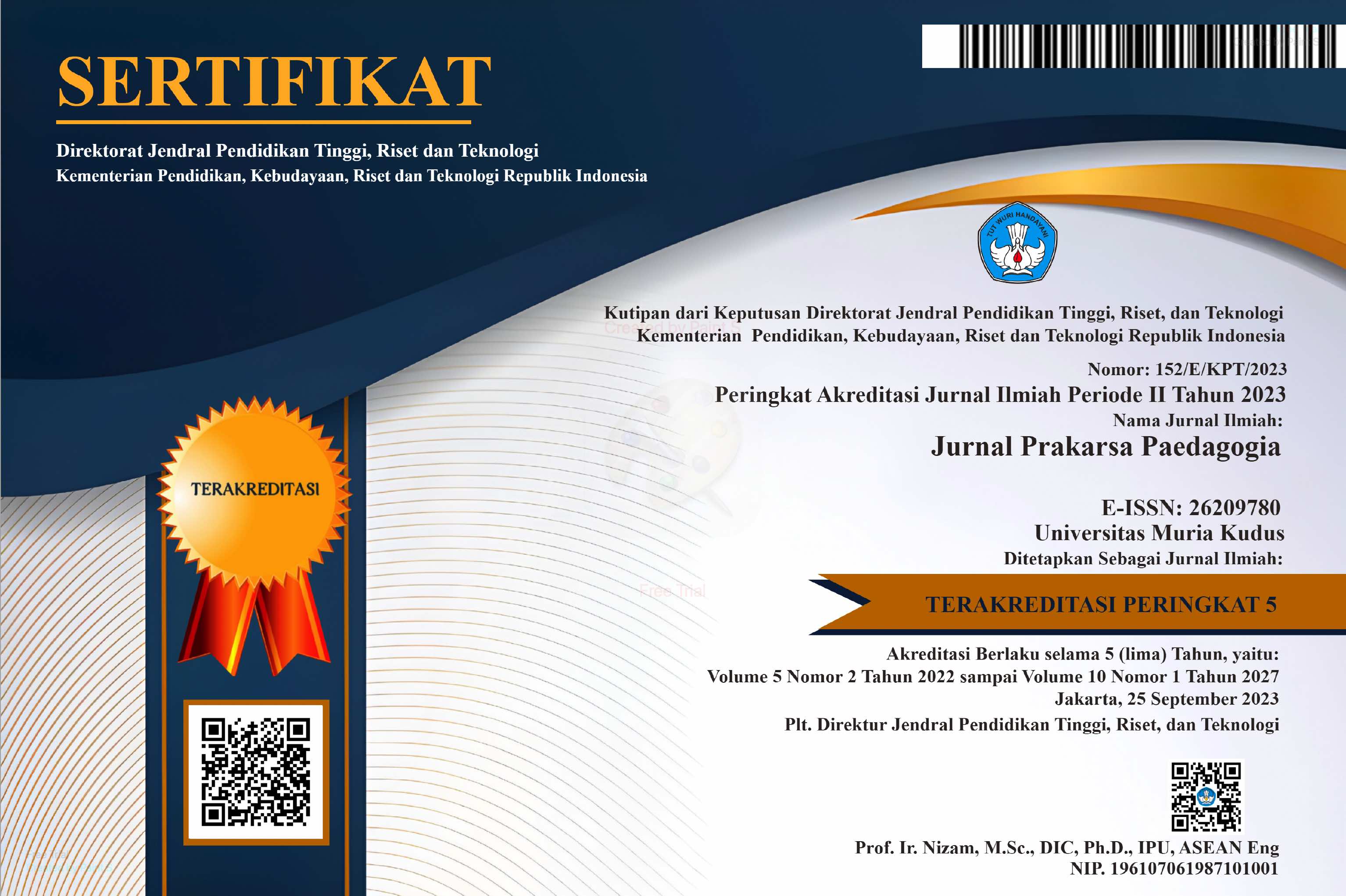MINI-REVIEW PEMBELAJARAN DARING SELAMA PANDEMI COVID-19: KEUNTUNGAN DAN TANTANGAN
Abstract
The emergence of COVID-19 has an impact on the world of education. The learning process that is commonly carried out face-to-face in class must change to distance learning using online learning. This article aims to review research articles on the advantages and challenges of online learning during the COVID-19 pandemic. The research method uses the literature review method of research articles on the application of online learning during the COVID-19 pandemic published in 2020. The results of the review show the advantages of using online learning can be classified into two categories, namely the advantages in the area of processes and area of impacts. The challenges of using online learning are internet access, the burden of quota costs, the availability and support of technology or devices. Teacher creativity, student characteristics, environmental support and geographical conditions are also challenges that need to be considered so that the achievement of learning outcomes through online learning can be optimized.
Keywords
Full Text:
89-96 (Bahasa Indonesia)References
Al-Rahmi, W. M., Othman, M. S., & Yusuf, L. M. (2015). The Effectiveness of Using E-Learning in Malaysian Higher Education: a Case Study University Teknologi Malaysia. Mediterranean Journal of Social Sciences, 6(5S2), 625–637. https://doi.org/10.5901/mjss.2015.v6n5s2p625
Ally, M. (2004). Foundations of Educational Theory for Online Learning. In T. Anderson & F. Elloumi (Eds.), The Theory and Practice of Online Learning (pp. 3–31). Retrieved from cde.athabascau.ca/online_book
Anderson, T. (2004). TOWARD A THEORY OF ONLINE LEARNING. In T. Anderson & F. Elloumi (Eds.), Theory and Practice of Online Learning (pp. 33–59). Retrieved from cde.athabascau.ca/online_book
Anhusadar, L. (2020). Persepsi Mahasiswa Piaud Terhadap Kuliah Online di Masa Pandemi Covid 19. KINDERGARTEN: Journal of Islamic Early Childhood Education, 3(1), 44–58. https://doi.org/http://dx.doi.org/10.24014/kjiece.v3i1.9609
Arnesti, N., & Hamid, A. (2015). Penggunaan Media Pembelajaran Online – Offline dan Komunikasi Interpersonal Terhadap Hasil Belajar Bahasa Inggris. Jurnal Teknologi Informasi & Komunikasi Dalam Pendidikan, 2(1). https://doi.org/10.24114/jtikp.v2i1.3284
Darmalaksana, W., & Dkk. (2020). Analisis Pembelajaran Online Masa WFH Pandemic Covid-19 sebagai Tantangan Pemimpin Digital Abad 21. Karya Tulis Ilmiah, 1–12.
Firman, & Rahayu, S. (2020). Pembelajaran Online di Tengah Pandemi Covid-19. Indonesian Journal of Educational Science (IJES), 2(2), 81–89. https://doi.org/10.31605/ijes.v2i2.659
Gunawan, Suranti, N. M. Y., & Fathoroni. (2020). Variations of Models and Learning Platforms for Prospective Teachers During the COVID-19 Pandemic Period. Indonesian Journal of Teacher Education, 1(2), 61–70.
Harandi, S. R. (2015). Effects of E-Learning on Students’ Motivation. Procedia - Social and Behavioral Sciences, 181(May), 423–430. https://doi.org/10.1016/j.sbspro.2015.04.905
Herayanti, L., Fuaddunnazmi, M., & Habibi, H. (2017). Pengembangan Media Pembelajaran Berbasis Moodle pada Mata Kuliah Fisika Dasar. Jurnal Pendidikan Fisika Dan Teknologi, 1(3), 205. https://doi.org/10.29303/jpft.v1i3.260
Hikmat, Hermawan, E., Aldim, & Irwandi. (2020). Efektivitas Pembalajaran Daring Selama Masa Pandemi Covid-19 : Sebuah Survey Online. Karya Tulis Ilmiah, 1–7.
Hui, D. S., I Azhar, E., Madani, T. A., Ntoumi, F., Kock, R., Dar, O., … Petersen, E. (2020). The Continuing 2019-nCoV Epidemic Threat of Novel Coronaviruses to Global health — The Latest 2019 Novel Coronavirus Outbreak in Wuhan, China. International Journal of Infectious Diseases, 91, 264–266. https://doi.org/10.1016/j.ijid.2020.01.009
Kattoua, T., Allozi, M., & Alrowwad, A. (2016). A Review of Literature on Knowledge Management Using ICT in Higher Education. International Journal of Bussiness Management and Economic Research (IJBMER), 7(5), 754–762.
Khasanah, D. R. A. U., Pramudibyanto, H., & Widuroyekti, B. (2020). Pendidikan dalam Masa Pandemi Covid-19. Jurnal Sinestesia, 10(1), 41–48.
Kim, K. J., & Frick, T. (2011). Changes in Student Motivation During Online Learning. Journal of Educational Computing Research, 44(1), 1–23. https://doi.org/10.2190/EC.44.1.a
Kuntarto, E. (2017). Keefektivan Model Pembelajaran Daring dalam Perkuliahan Bahasa Indonesia di Perguruan Tinggi. Journal Indonesian Language Education and Literature, 3(1), 99–110. https://doi.org/DOI:http://dx.doi.org/10.24235/ileal.v3i1.1820 110
Menteri Pendidikan dan Kebudayaan Republik Indonesia. Surat Edaran Nomor 4 Tahun 2020 tentang Pelaksanaan Kebijakan Pendidikan dalam Masa Darurat Penyebaran Coronavirus Disease (COVID-19). , (2020).
Pangondian, R. A., Santosa, P. I., & Nugroho, E. (2019). Faktor - Faktor yang Mempengaruhi Kesuksesan Pembelajaran Daring dalam Revolusi Industri 4.0. Seminar Nasional Teknologi Komputer & Sains (SAINTEKS), 1(1), 56–60. Retrieved from https://www.prosiding.seminar-id.com/index.php/sainteks/article/view/122
Perry, A., & Hammond, N. (2002). Systematic Reviews: The Experiences of a PhD Student. Psychology Learning & Teaching, 2(1), 32–35. https://doi.org/10.2304/plat.2002.2.1.32
Pratiwi, E. W. (2020). Dampak COVID-19 Terhadap Kegiatan Pembelajaran Online di Sebuah Perguruan Tinggi Kristen di Indonesia. Perspektif Ilmu Pendidikan, 34(1), 1–8. https://doi.org/doi.org/10.21009/PIP.341.1
Rahmania, S. (2020). Persepsi Mahasiswa Kimia dan Pendidikan Kimia pada Pembelajaran Daring saat Pandemi. Artikel Diskusi Dosen, 1–7.
Sit, J. W. H., Chung, J. W. Y., Chow, M. C. M., & Wong, T. K. S. (2005). Experiences of Online Learning: Students’ Perspective. Nurse Education Today, 25(2), 140–147. https://doi.org/10.1016/j.nedt.2004.11.004
Syarifudin, A. S. (2020). Implementasi Pembelajaran Daring untuk Meningkatkan Mutu Pendidikan Sebagai Dampak Diterapkannya Social Distancing. Metalingua Jurnal Pendidikan Bahasa Dan Sastra Indonesia, 5(1), 31–34.
Verawardina, U., Asnur, L., Lubis, A. L., & Hendriyani, Y. (2020). Reviewing Online Learning Facing the Covid-19 Outbreak. Talent Development & Excellence, 12(3), 385–392.
Waryanto. (2006). Online Learning sebagai Salah Satu Inovasi pembelajaran. Pythagoras Jurnal Matermatika Pendidikan Matematika., 2(1), 10–23.
World Health Organization. (2019). SARS (Severe Acute Respiratory Syndrome). Retrieved from https://www.who.int/ith/diseases/sars/en/
World Health Organization. (2020). Coronavirus Disease (COVID-19) Outbreak Situation. Retrieved from https://www.who.int/emergencies/diseases/novel-coronavirus-2019
Zhafira, N. H., Ertika, Y., & Chairiyaton. (2020). Persepsi Mahasiswa Terhadap Perkuliahan Daring sebagai Sarana Pembelajaran Selama Masa Karantina COVID-19. Jurnal Bisnis Dan Kajian Strategi Manajemen, 4(1), 37–45.
DOI: https://doi.org/10.24176/jpp.v3i1.4989
Refbacks
- There are currently no refbacks.
Copyright (c) 2020 Jurnal Prakarsa Paedagogia

This work is licensed under a Creative Commons Attribution-NonCommercial-ShareAlike 4.0 International License.
Visitors of the Paedagogia Prakarsa Journal Status
Country of Origin of Visitors:
Jurnal Prakarsa Paedagogia dari Fakultas Keguruan dan Ilmu Pendidikan Universitas Muria Kudus is licensed under a Creative Commons Attribution 4.0 International License.
Dedicated to:







